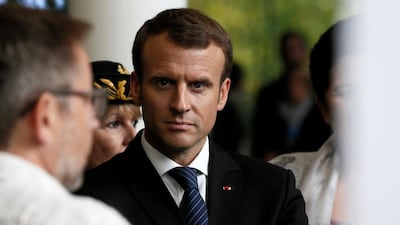Emmanuel Macron successfully dodged cyberattacks and fake news reports that were widely blamed on a Kremlin effort to destabilise his 2017 presidential campaign.
Now, with France convulsed by violent protests, the Russians appear to be back -and may be hitting closer to their mark. Among 600 Twitter accounts known to promote Kremlin views, the top hashtag now is #giletsjaunes, the French name for the so-called Yellow Vests protest movement, according to the Alliance for Securing Democracy, a unit of the German Marshall Fund of the US that monitors those accounts and other pro-Kremlin activity.
The Twitter accounts monitored by the alliance usually feature US or British news. But the French protests “have been at or near the top” of their activity for at least a week, said Bret Schafer, the alliance’s Washington-based social media analyst. “That’s a pretty strong indication that there is interest in amplifying the conflict” for audiences outside France, he says.
A major theme of recent tweets is that French law enforcement is on the verge of mutiny. That assertion – which doesn’t appear to be supported by facts – resembles other Kremlin-backed disinformation campaigns that have tried to engender mistrust in Western governments and show that liberal democracies are in decline, Mr Schafer said.
Much of the tweeted material comes from Russian state media outlets including the Sputnik news website, the RT television network, and Ruptly, a German-based video news agency that belongs to RT. These outlets are covering the French crisis closely; RT has said that 12 of its journalists have been injured in the protests, far more than any other news organisation.
Sputnik and RT have reported in recent days that most French police no longer support Macron and are siding with the protesters. Their sources: representatives of two small police unions that together won less than 4 percent of votes in nationwide union elections this month. Sputnik and RT also have shown a video - widely shared on French social media - of police in the southwestern town of Pau removing their helmets in what was described as a sign of solidarity with protesters. Local police and journalists on the scene said the description was untrue. They said some officers had briefly removed their helmets to talk with protesters before putting them back on.
Sputnik and RT didn’t immediately respond to requests for comment.
_______________
Read more:
Barricades burn as new 'yellow vest' protests hit Paris
Macron braces for new wave of protests as anger grows
Eiffel Tower to close ahead of 'yellow vest' protests
_______________
Mr Macron complained repeatedly during his 2017 campaign that Kremlin-controlled media outlets were spreading fake news about him, because he took a tougher stance on Russia than his chief rivals, Marine Le Pen of the far-right National Front and François Fillon of the conservative Republicans. But negative stories, such as a Sputnik report claiming Mr Macron lived a “double life” and was backed by a “wealthy gay lobby,” never gained traction.
In one instance, a bogus website resembling the site of a Belgian newspaper reported that Mr Macron’s campaign was being bankrolled by Saudi Arabia. The source of the hoax was never determined, but the European Union’s East Stratcom Task Force, which tracks Russian disinformation efforts, said it bore striking similarities to an earlier incident traced to a Russian “troll factory.”
Separately, the Macron campaign was hit with repeated email phishing attacks resembling those used by Russia against Democratic Party organisations in the U.S. The Kremlin said it had no involvement in any fake news or cyberattacks on Macron, describing such accusations as “slander.”
One obstacle for any would-be attacker was that Mr Macron emerged as the front-runner late in the campaign, after Mr Fillon was ensnared in corruption allegations. Less than 48 hours before Mr Macron’s May 2017 runoff against Mrs Le Pen, a trove of hacked documents from his campaign was released online. But the attack appeared rushed and clumsy, and received little notice in France because of a government ban on political media coverage in the final hours before polls open.
It’s unclear whether recent reports by Russian news outlets, or Twitter activity on pro-Kremlin accounts, are shaping public opinion in France. While RT and Sputnik have French-language sites, their viewership is limited, and Facebook has been the chief venue for French social-media postings about the Yellow Vests.
A Facebook spokesperson told Bloomberg News that “content promoting violence and harm” is banned and removed from the site “as soon as we become aware of it.”
Still, when negative information is widely and persistently promoted, at least some of it is likely to reach French social-media users, Mr Schafer said. And the pro-Russian reports keep coming: Sputnik reported Wednesday that Vladimir Putin had met in Moscow with Mr Macron’s former political rival, Mr Fillon.

